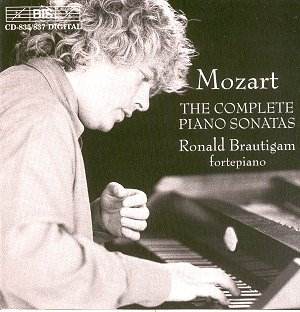Wolfgang Amadeus MOZART
Piano Sonatas Nos. 1 - 18; Fantasie in C minor
 Ronald Brautigam,
fortepiano
Ronald Brautigam,
fortepiano
 BIS
CD-835/837 [380.54] 6 CDs for the price of
3
BIS
CD-835/837 [380.54] 6 CDs for the price of
3
Crotchet
£39.95 Amazon UK
AmazonUS
$53.97

In 1996 Ronald Brautigam recorded all of Mozart's music for solo piano on
a superb 1992 fortepiano built and maintained by Paul McNulty of Amsterdam
(after Anton Gabriel Walter c. 1795). BIS originally released the recordings
on ten single full priced CDs. Now, the first six discs which contain the
18 sonatas plus the linked Fantasie, have been reissued at bargain price
in a 6-CD jewel case. This makes not only economic sense, but also allows
the listener primarily interested in the sonatas to purchase them without
unwanted additional material. It also has the effect of bringing this set
into direct competition with the identical compilations from Mitsuko Uchida
(5 CDs - Philips, medium price) and András Schiff (5 CDs - Decca,
budget price).
Compared with Beethoven's 32 piano sonatas, Mozart's 18 have never truly
caught the fancy of the record buying public in the quite same way his operas,
piano concertos and later symphonies have done. Perhaps, like Haydn but unlike
Beethoven, the sheer number of symphonies has mitigated against great popularity
(except for the last six). But this cannot fairly be said of the piano sonatas
where Beethoven's more popular set is, of course, considerably greater in
number. More likely is the nature of the works themselves. Mozart did not
always choose to prioritise instantly attractive melodies in the piano sonatas
in the same way as he did in the symphonies and the operas - although, of
course, there are exceptions such as the popular opening movement of K545
and the 'Turkish Rondo" from K331. Nevertheless the sonatas score heavily
in charm and, in the last six years of his life, in considerable depth of
expression.
The fortepiano has not always had a positive press. For many music lovers
early experiences of listening to the instrument were almost entirely negative.
Sounding more like neglected cottage-uprights with attendant poor tuning
and clattery tone, the first recordings did no favours to the instrument
at all. But for several years now the majority of recordings have captured
a range of instruments all with uniquely valuable aspects, well tempered
and tuned and with pleasing individual characteristics. The instrument played
here by Ronald Brautigam is one of the finest yet recorded.
Brautigam plays with remarkable style and bravura. With such fine recording
quality the effect for the listener at home is extremely intimate with that
sense of being the only intended audience coming over particularly well.
The musical argument constantly intrigues and Brautigam never allows interest
to flag. Sudden forte chords, rapid runs and melting key changes are all
given due weight and the rubato is always at the service of the music. Indeed
Brautigam finds more colour in the fortepiano than any other player I have
heard and regularly throughout the set one recognises with delight that the
particular way Mozart wrote these sonatas was designed for an instrument
very much like this one and not, of course, the modern pianoforte.
Even if you already have a set of performances played on the modern piano,
I would strongly urge you to investigate this box. If you haven't, Brautigam
would be my top recommendation.
Simon Foster
Performance

Sound


